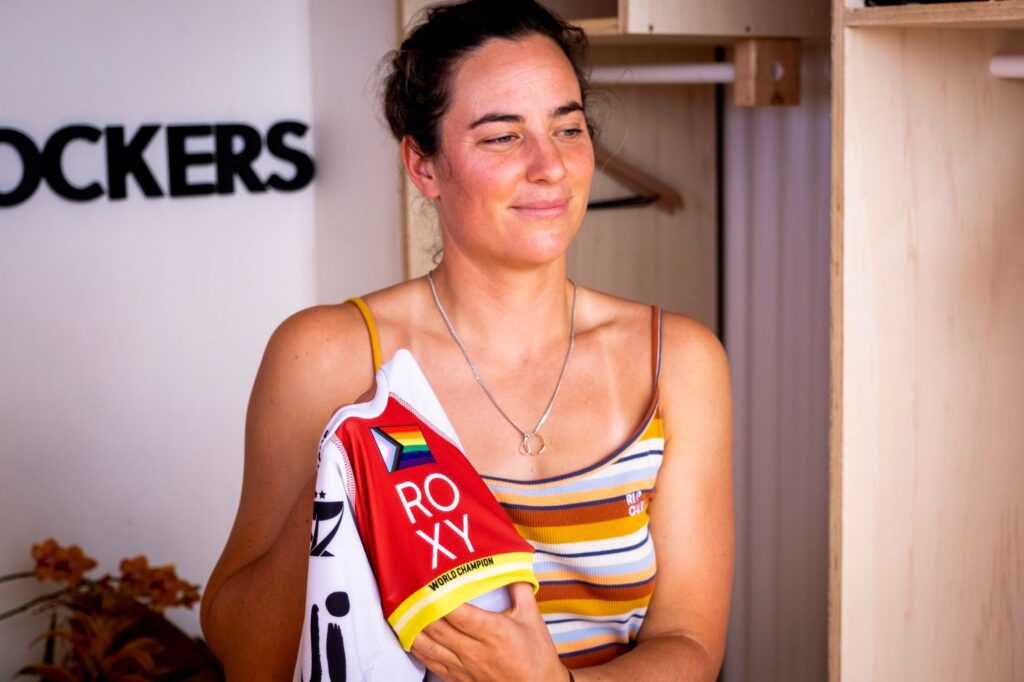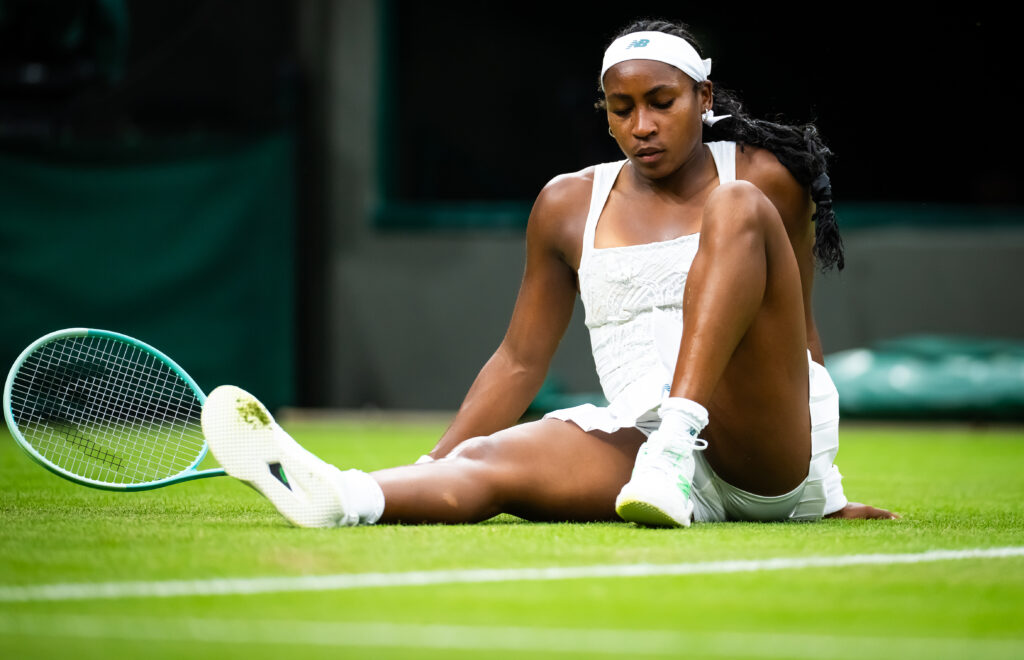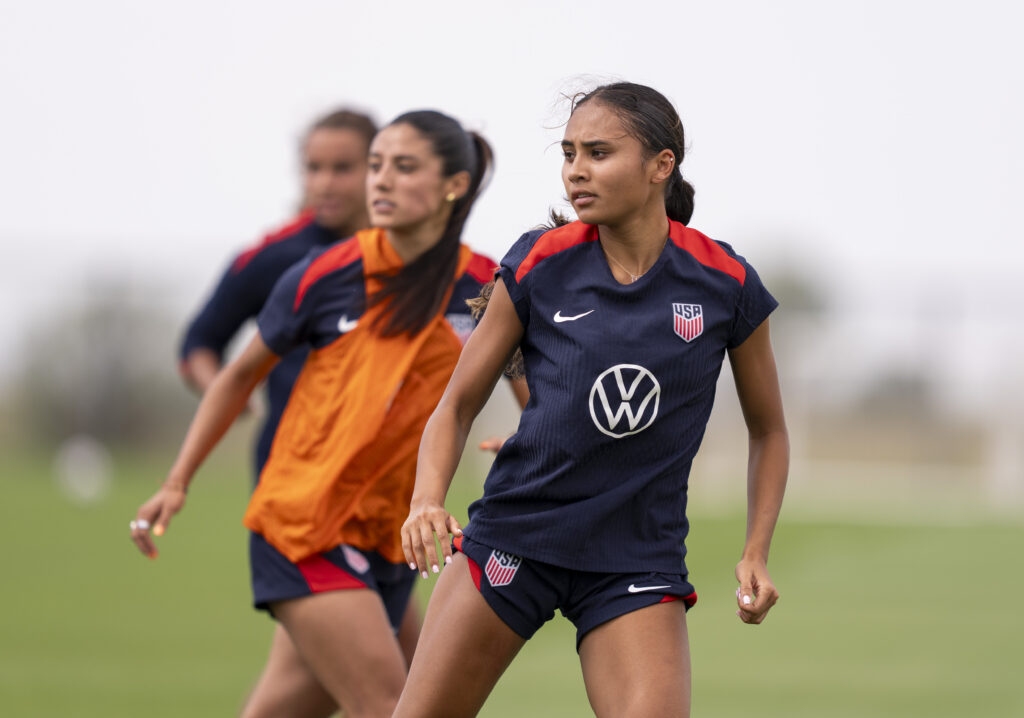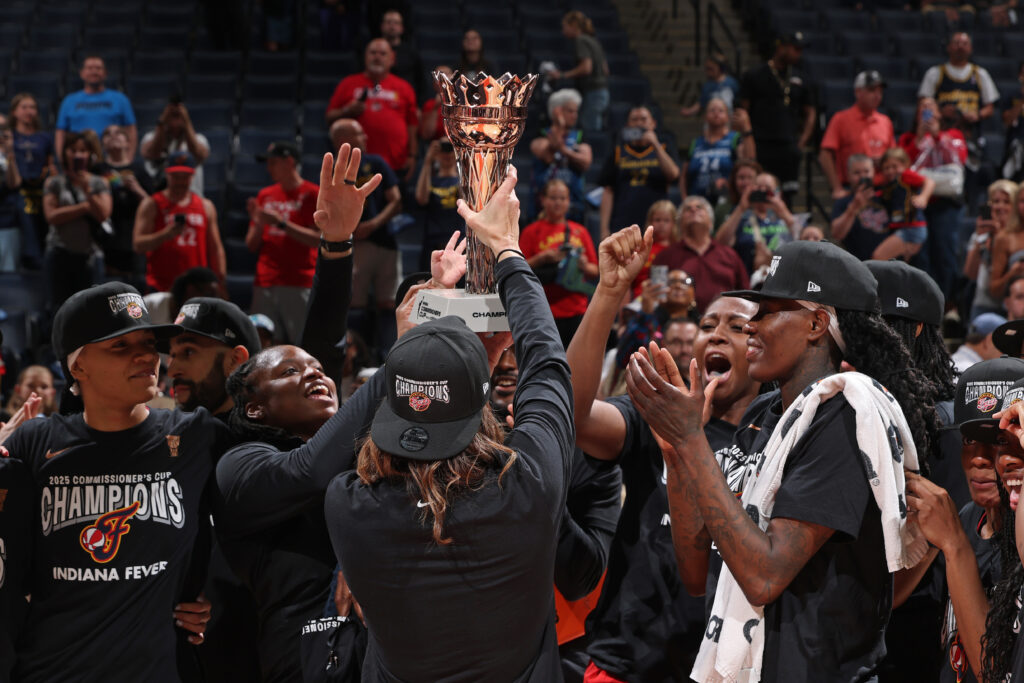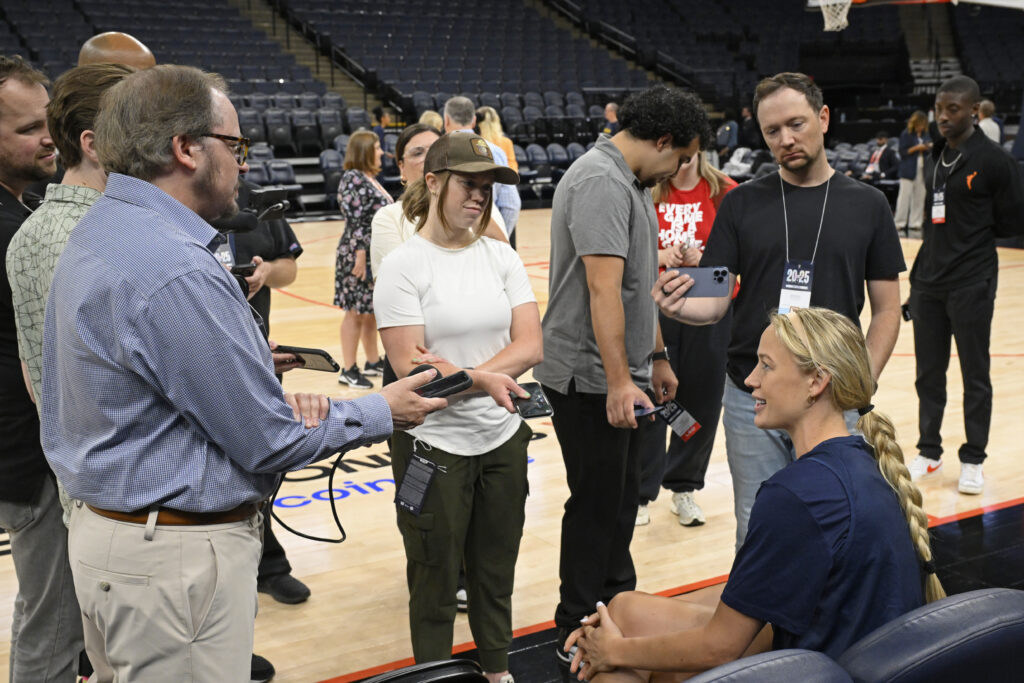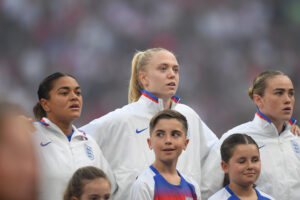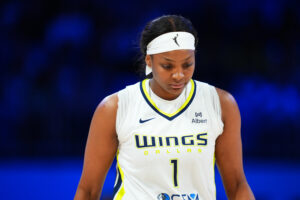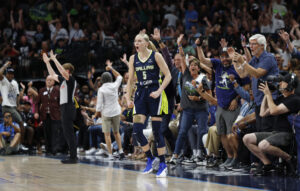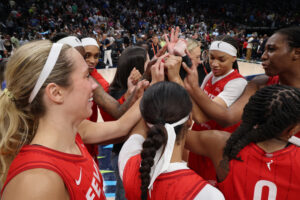Tyler Wright is now the first woman to ever win a Championship Tour event at Pipeline on the North Shore of Oahu, but her history making performance on the 2021 tour doesn’t stop there. After battling back from post-viral syndrome that took her away from surfing for more than two years, Wright is not only crushing waves, but using her voice to expand conversations about equality in the sport. Wright recently sat down with JWS to talk about being the first surfer to wear the Progressive Pride Flag, her activism around the Black Lives Matter movement, and how illness changed her perspective on life.
To start here, I want to acknowledge the tragic passing of a recreational surfer at Honolua Bay. How did surfers react to that?
It’s always tragic and it’s always sensitive and kind of traumatic. No one ever sees it coming. I think there’s a lot of shock involved in what happened at Honolua and the tragic passing of that gentleman. I think it caught everyone by surprise.
You put up some impressive scores including a perfect 10. How does it feel to be back in the water for the 2021 Championship Tour?
I’m really grateful that I can even be in this position again. It’s been quite the journey to get here and to be able to really go out and enjoy the start. To be back in the water and start the 2021 championship season, I feel really grateful and intentful on what I’m here to do.
And the first Perfect 10 of the 2021 Season goes to... @tylerGwright. pic.twitter.com/rBwN5ZjUjG
— World Surf League (@wsl) December 8, 2020
In addition to your perfect 10, you made history by adding the Progressive Pride Flag to your jersey. What drove you to do that and what was the process like to get that done?
There’s a few different things that really led me to that. I fell in love a few years ago, and that changed my life forever. It was one of those things. I had a few conversations with my friends at the time — this is back in 2018 before I got sick — it kind of came up then, and because of the incredible human being that I had met, wanting to thank her. I wasn’t really publicly out. I think it’s been quite the journey between there and now, and understanding the importance of representation, the importance of inclusion and what it actually means to see that in surfing.
I essentially asked the WSL if I could surf with the Progressive Pride Flag, and they were completely behind it and have supported me all the way through. It’s two-fold. Honoring those who have come before me and also for the generations to come to know that this is a safe space. And we’re aware as well that it’s important to continue these conversations around equality and inclusion

I think a lot of people in the LGBTQIA+ community, myself included, can really relate to the inner journey that you have to go on before you can exist publicly as this full version of yourself and everyone goes on a different journey. I’m curious if you could share a bit about your experience and what it means to be an out athlete.
I just didn’t get it at first, you know. When I first fell in love, I said, “No, I will not be known for my sexuality. My sexuality will not be part of my career.” I think people expect that if you do identify with the LGBTQIA+ community, that you all of a sudden don’t have internalized homophobia, whereas I felt that I was raised in a really homophic, racist, and sexist environment so I had that in me even though it’s not something that I really knew.
I think through this all, and when I got sick, and then through COVID, it allowed me to come back and ask “What athlete do I want to be? And what do I want to stand up for?” I just started noticing who was speaking about it and how inspired I was.
It’s been a journey to find out who I am, and what kind of athlete I want to be, and who I want to stand up for. It’s not something I embraced as a younger athlete, but I’ve been in the sport for a while now and am a bit more settled in who I am.
Generally speaking, when people think about surfing, they envision this environmentally conscious, laid back, liberal culture, but what would you say is the reality for LGBTQIA+ and BIPOC surfers and what work needs to be done to make the sport more inclusive?
The way I see it is that we’re not exempt. We’re not exempt from society’s great issues. The work does need to be done. It’s continuing those conversations whether that’s behind closed doors or in public. Like every sport, different issues show up in different ways and we have to think about how we dig in and get in the game, how we show up, how we do better.
You’ve been very public with your activism, what has been the reaction?
I’m sure there’s been a lot said on social media — I don’t put too much value in that. The conversations that have come from the Black Lives Matter protesting in Cabarita in October have been incredible. I feel extremely lucky to be in this position, and to have the platform that I have and to be able to use it in this way. It’s something that I don’t take for granted. I don’t agree with being a-political. It’s a human rights thing and human decency and I just don’t see how anyone can really argue with that.
Appreciate you sharing that. Looking at your career as a surfer, for the past two years, you’ve been battling through post-viral syndrome. What powered you through that time and has it changed your perspective on the sport at all?
Yup [laughs]. I don’t know what got me through that time still, sometimes I do, sometimes I don’t. It was really rough, but I had a partner at the time who was with me for everything and helped me through that and without her, I wouldn’t be here today. I’m incredibly lucky that I am here today. It has changed me. I think that and COVID has given me time to think about what I want my career to be about and what I want to stand up for.
I definitely look at my sport a little bit differently. Two and a half years out is a long time for someone in the middle of their career to be out of their sport and to be able to reflect. Some of what I saw I didn’t like, and so I was vocal about it, and I will continue to be vocal regardless of what anyone really thinks. I think surfing has views and I want to challenge some of them. We’ve done a good job marketing ourselves as counter culture, rebels, progressive, but I think surfing is on the conservative side and has a dominant hetero-patriarchal ideology at its core. I definitely think there should be a few different voices in the conversation at surfing’s core to create a connected community. What will that look like? I don’t know. How does that happen? I don’t know. But you can change it publicly, you can change it behind closed doors, you can change it with conservations.

In the same vein of personally being changed, from the sport side, you just mentioned being away from a sport in the middle of your career for two and a half years. Did the sport change at all in terms of style or technique in that time?
In a technical sense, I’ve watched a lot, and the things that I look for haven’t changed, but I think surfing is always progressing and you can really see that in our next generation between the ages of about sixteen and twelve at the moment. I’m so psyched for them to hurry up, well not to hurry up, to absolutely take their time with respect to the growing up process, but also the quicker they come up, the earlier I can retire. They are so good.
And what I like to see, which is probably one thing that I will note as being different, but the next generation, when they’re in the line up, they know they belong in the line up and I think that’s something that’s really different from when I came through. I love seeing the difference of mentality and I feel like that’s our biggest progress, the younger generation owning that they are that good. I love it, I love to see it.
That’s incredible to hear. As a parallel, you went through some really heavy stuff during the time that you were sick — periods of isolation and being apart from the things that you love. So many people are going through varying degrees of that right now this year. Do you have any general advice on staying focused and keeping your eyes on the horizon?
This year is rough and being able to conceptualize this year while we’re still in it and while so many different things are going on is almost impossible. It’ll take us a few years to really process what this year’s been about. One of my biggest things is having to adjust your expectations of yourself. I know with COVID it’s like well, if I get out of bed I nailed it, and if I don’t, you know what, I nailed it too. You have to find that balance of, without pushing yourself over the edge, engaging with things that you still like. For me, I love learning so I essentially just deep dived on the internet on women’s sports, sexism, racism, and read so many different books. I never ever watched sports in my life and now I’m the biggest women’s sports fan there is, I’m such a nerd. I’m trying to learn as much as I can and that’s what I really got engaged with. It’s something that helped me understand who I am a little bit more — the representation of these other incredible athletes and representation that I don’t have in my sport.
Different human beings have different journeys, but keep learning, keep educating yourself and if you feel like shit, it’s completely okay. It’s a judgement free zone. Don’t expect yourself to go out and win everyday. You are where you are and that’s incredible. You’re doing a great job.
I prioritize recovery, and understanding recovery as well. Some days your mental, emotional, and intellectual output is through the roof, so how do you recover from that? It’s about taking care of yourself, being mentally and emotionally aware, and asking for help as well. It’s been a rough year.
That’s all really important to hear. Shifting back to the tour, it’s changed a bit for 2021. Are there any changes that you’re particularly excited about?
One thing is the final, the surf off for the world title. For a competitor, that is what I have wanted for such a long time, just to surf the best against the best, woman on woman, best of three. I couldn’t imagine anything better, just as a purely competitive game. The way it was was cool and it’s fun, and there’s tension, but there’s way more intense competition if you’re just straight running at the person who is in second place. It’s a whole new game that none of us have played.
So it’ll be the top five surfers who will be competing for the world title at Lower Trestles?
Yeah so five and four will face off, and then whomever wins that, four and three, three and two, and then two and one go head-to-head for three rounds. It’s that next level of competitiveness, that next level of strategy and analytical thinking — it’s so fun.
Speaking of the best of the best, I was watching you in the quarterfinals against Stephanie Gilmore. That was incredible. You’re both such powerhouses, you’re fellow Australians, what is the vibe like when you’re out there competing against your peers?
Steph and I have known each other for a long time. The last ten months we’ve all gotten so close, we all live in the same area, and at the start of COVID I was kind of okay, but I wasn’t really. I was still really heavily having PTSD, I was still having heavy flashbacks and was kind of functioning, but not really and I was still really underweight. But it was one of those things where Steph was like, “Come on, you’re coming to surf.” I would disappear for weeks on end because I was so used to isolation as well, I had kind of grown accustomed to it. But her and Nikki [Van Dijk] and some of the girls, they were like, “Come on, we’re going surfing, this is what we’re doing,” and got us into a pattern with surfing with everyone through COVID, and we only hung out with each other, about five or six of us. So coming back, we’re all like, “Okay, let’s do it.”
It’s wild to me because we’re all such good friends and really care about each other and still get to go and compete. You saw that heat in Maui, we weren’t holding back. On that last wave, on that 10, I knew the wave that she [Stephanie Gilmore] had before, and before I took off on the last one, I saw where she was and it didn’t look like she made it to the end so I was like, “Okay this is big, I don’t think she’s completed and this thing [wave] is lining up so good,” so 100% when I came out of that barrel I was like, “Yup, you’re done,” purely from a smartass competitive point of view. It was pure joy because I have been kicked around, I have been schooled by Steph so many times in that same situation. In the last few years, I’ve either won or lost against Steph. Actually, I’ve only lost against Steph, this was the first time I won, I’m pretty sure.
It’s hard to explain, but if you can have such close friends on tour, you’re the luckiest, and then to go out and know full well that you’re going to go out and absolutely go head-to-head and give it your absolute all, I don’t think there’s a better combination because you know at the end of the day no one care too much about who actually wins, we’re going to do it 100 more times throughout our careers.
It’s such a special and unique relationship and it’s so awesome, from our vantage point as fans, to be able to watch you guys. For some girls out there, they see surfing as this awesome sport, but being able to go out into the water and try it is really intimidating. Do you have any advice for those who are out there wondering how to even get started?
Literally just get started. I think surfing is a real equalizer. You’ve got this whole element, mother nature, and you’re literally working with mother nature on how to get good at something. It’s a really weird sport. As for leisure, social, physical, even mental, being out there in mother nature like that is one of the most beautiful things you could ever do. So my advice is to find somewhere that’s easy, getting a lesson always helps, but if you’ve got a friend who knows how to surf, just ask.
It’s a lot easier to mess up when your friends are there. One more question, what’s one piece of advice that’s really stuck with you in life through some of your most difficult moments?
I think learning about who you really are is an incredible journey. I think a healthy relationship with yourself is hugely important and one of those priorities in life. I don’t know if it sounds selfish or not, but I feel like it is the most important relationship. If you don’t have a healthy relationship with yourself, I don’t see how you can have healthy relationships outside of that. Finding out who you are and showing up for yourself as well.
I was reading Glennon Doyle, and there was a quote, “If there’s a choice between disappointing somebody else or disappointing yourself, choose somebody else” because you have to live with you everyday. I am 100% on the journey of life, which is learning and unlearning. Actually, that would be my advice, keep learning and unlearning, keep educating yourself, never stop. Especially in this COVID time, I feel like as a young woman who has been in the spotlight since I was really young, I am still learning how to become myself, what I want to stand up for, and how I want to show up.
